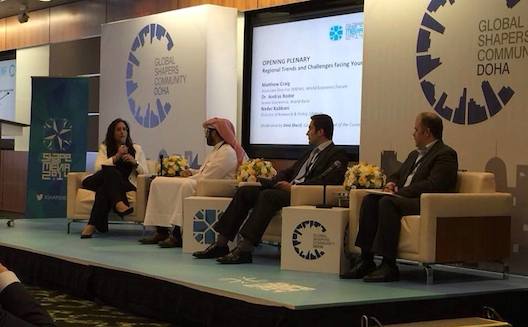How to monetize a social business without losing the human element


Dina Sherif discussing trends and challenges facing the region's
youth at the#ShapersMENA conference
Right after the Egyptian revolution in late 2011, Dina Sherif and Mohamed El Kalla decided to build a social business to promote responsible business practice, inclusive market growth, and social entrepreneurship, in the Arab region and eventually across all growth markets. They called this business Ahead of the Curve (ATC): “We need to find solutions to today’s problems now and to do that we need to be ‘ahead of the curve’, not just in how we think, but also in how we function and in how we choose to build our businesses,” says Sherif.
To achieve its vision, ATC chose to focus on 1) strategic consulting services in areas related to responsible and inclusive business practice, 2) philanthropic advisory services for organizations that are interested in catalytic social change, and 3) conducting research on areas related to the core mission of ATC. “We also provide specialized capacity building programs, awareness events and peer learning forums,” says Sherif during a Skype chat with Wamda. To date, they have conducted over a dozen training workshops and seminars on responsible business practice, social entrepreneurship, and inclusive growth.
The company is quickly building momentum and credibility in the region. Three years after its launch, ATC has worked with over 25 clients, 12 research partners, and more than 400 professionals from 8 countries. The team published a regional study on non-financial reporting trends in 17 MENA countries and an assessment of governance and transparency practices in Egypt. Currently, and in partnership with the American University of Beirut’s Olayan School of Business and The American University in Cairo’s Gerhart Center, they are finalizing a study of Corporate Responsibility and Social Entrepreneurship Practice Trends in seven Arab countries.

Dina Sherif discussing Social
Impact Rising in the Arab World at #RiseUp14 at The GrEEK
Campus (October
2014)
Entrepreneurship with Impact Ventures
“We can’t stay still, we are always working on the next pathway towards large scale change in the region,” she says. One of the most exciting pathways ATC is taking is Entrepreneurship with Impact Ventures (EwIV). EwIV is a venture of ATC that was launched in 2014.”
“EwIV has always been at the core of our strategy. It is about fostering new, more sustainable business paradigms in the Arab world,” said Sherif.
Through this venture, ATC provides both financial and non-financial support to 1) startups that pair financial viability with a social mission, or social businesses and 2) already existing large businesses that are looking to integrate marginalized segments of society in their value chain, or adopt inclusive business models.
EwIV is already leveraging the support and partnership of Pepsico, Silatech, MBC, and GIZ’s Responsible and Inclusive Business Hub (RIBH).
“All entrepreneurs struggle, but social business startups in particular don’t have access to the same kind or quality of support traditional or tech startups are getting, so we decided to do something about this,” explains Sherif.
In addition to equity finance, EwIV will enhance the capacities of social entrepreneurs through a training program called The Impact, which aims to create a regional network of social entrepreneurs who are empowered, inspired, and equipped to build sustainable social businesses.
“Our research reveals that companies in the region still struggle when it comes to creating win-win scenarios for their bottom line, and for society,” elaborated Sherif. EwIV is also working with already existing large companies on exactly that: leveraging their core business to create jobs and enhance livelihoods.
5 tips from Sherif on building and growing a social business:
1. Be clear on what your passion is, and don’t be ashamed to create a profitable business model around it. Don’t shy away from making money, it helps you scale faster.
2. Appreciate small wins but always think big. Otherwise, you run the risk of staying small.
3. The marriage of tech and social innovation is critical; enterprises should be mindful of how to use technology to scale impact.
4. Know your values and choose a board that will help you grow within the frame of those values.
5. Find a mentor who will not only give you advice, but who will stand by your side even as you struggle to find your way. For Sherif, that has been Fadi Ghandour – go out and find your own.


